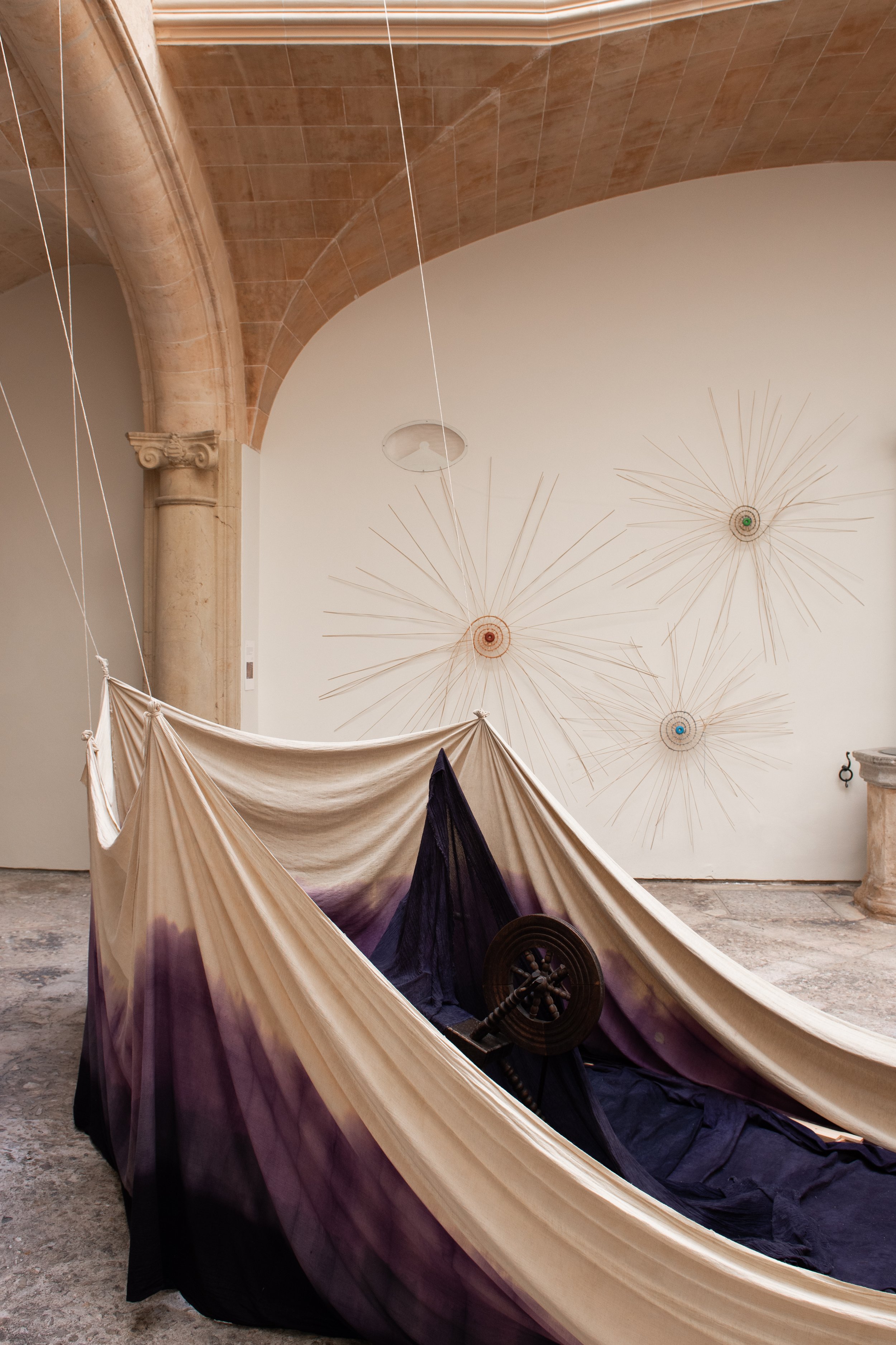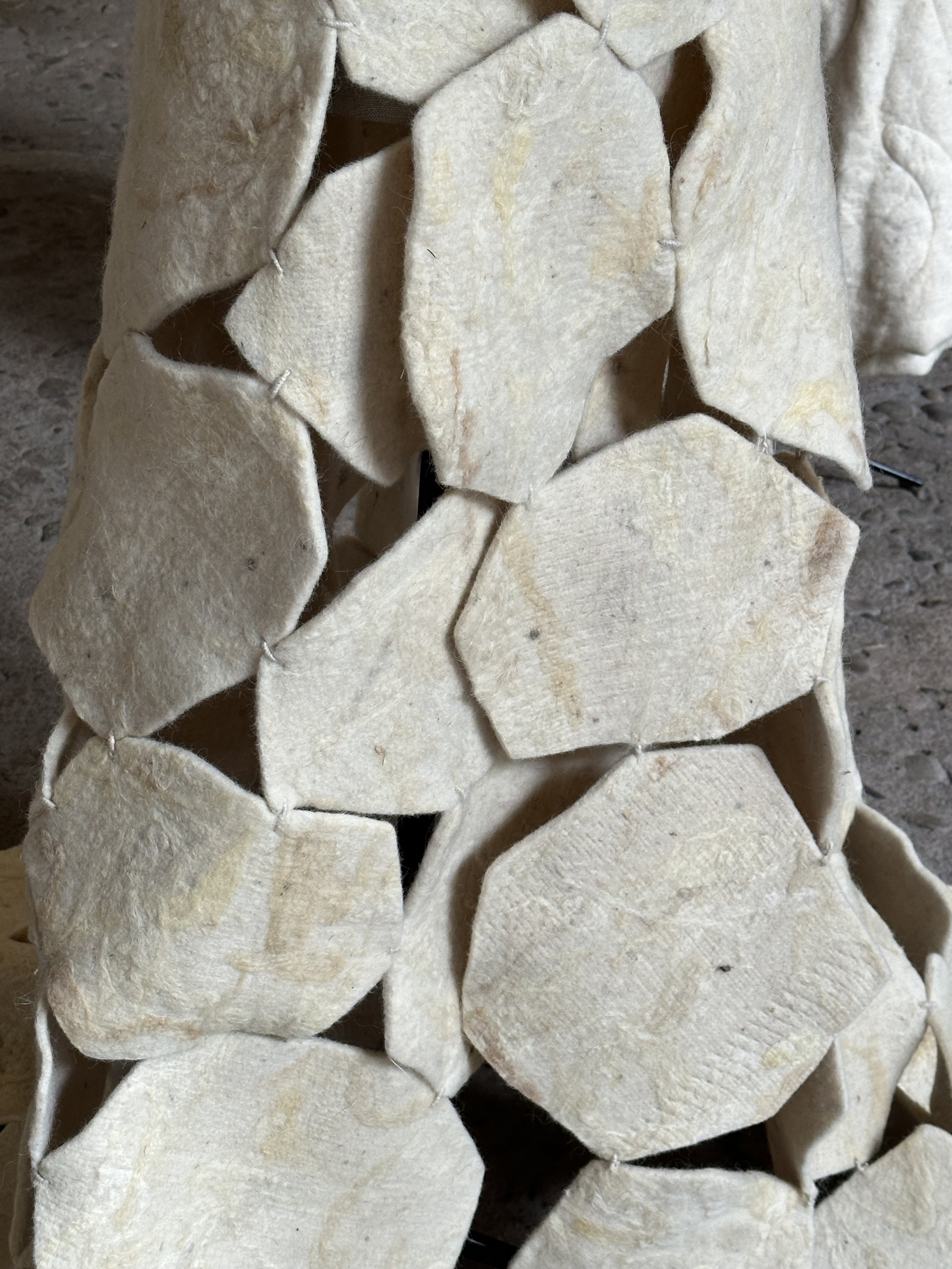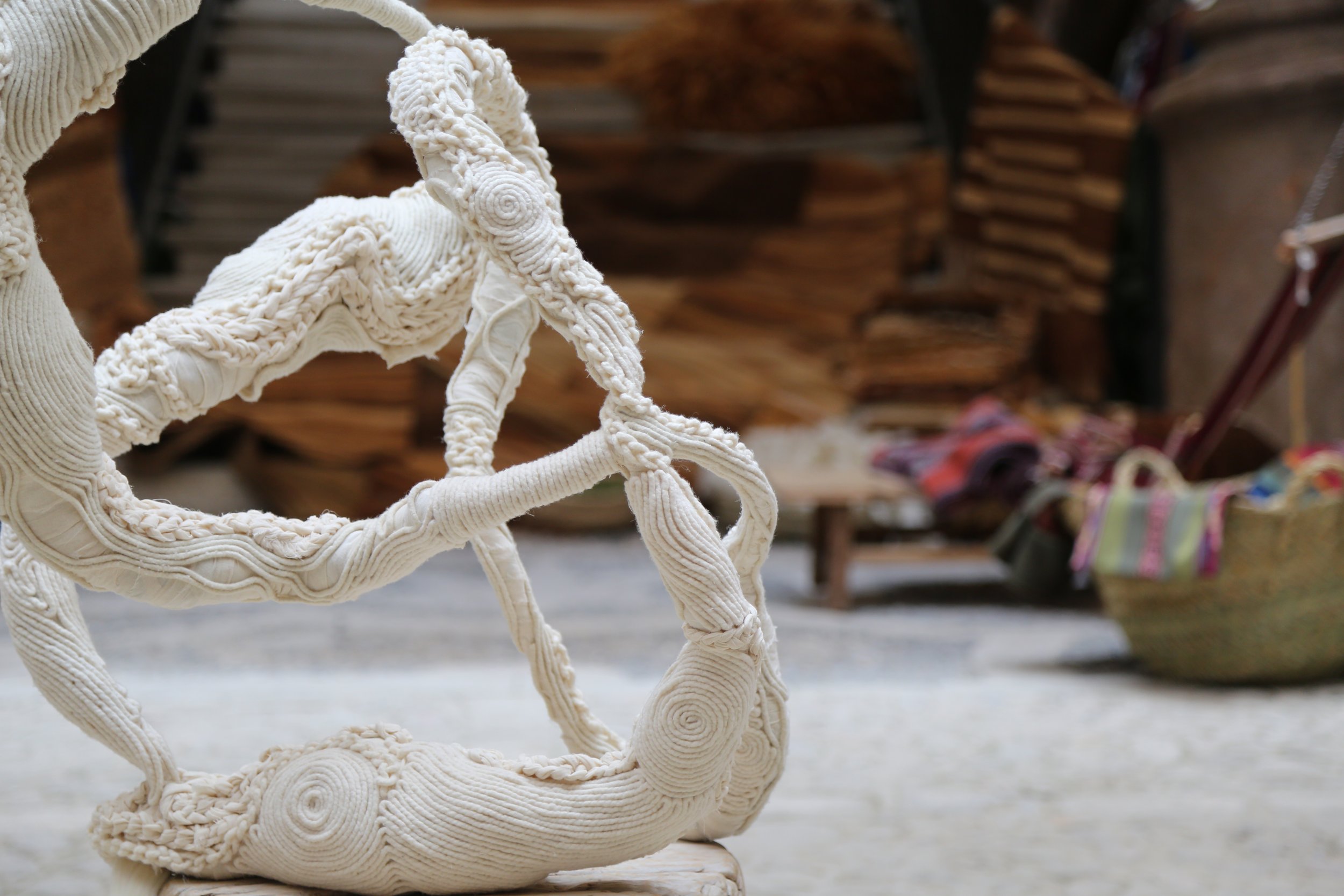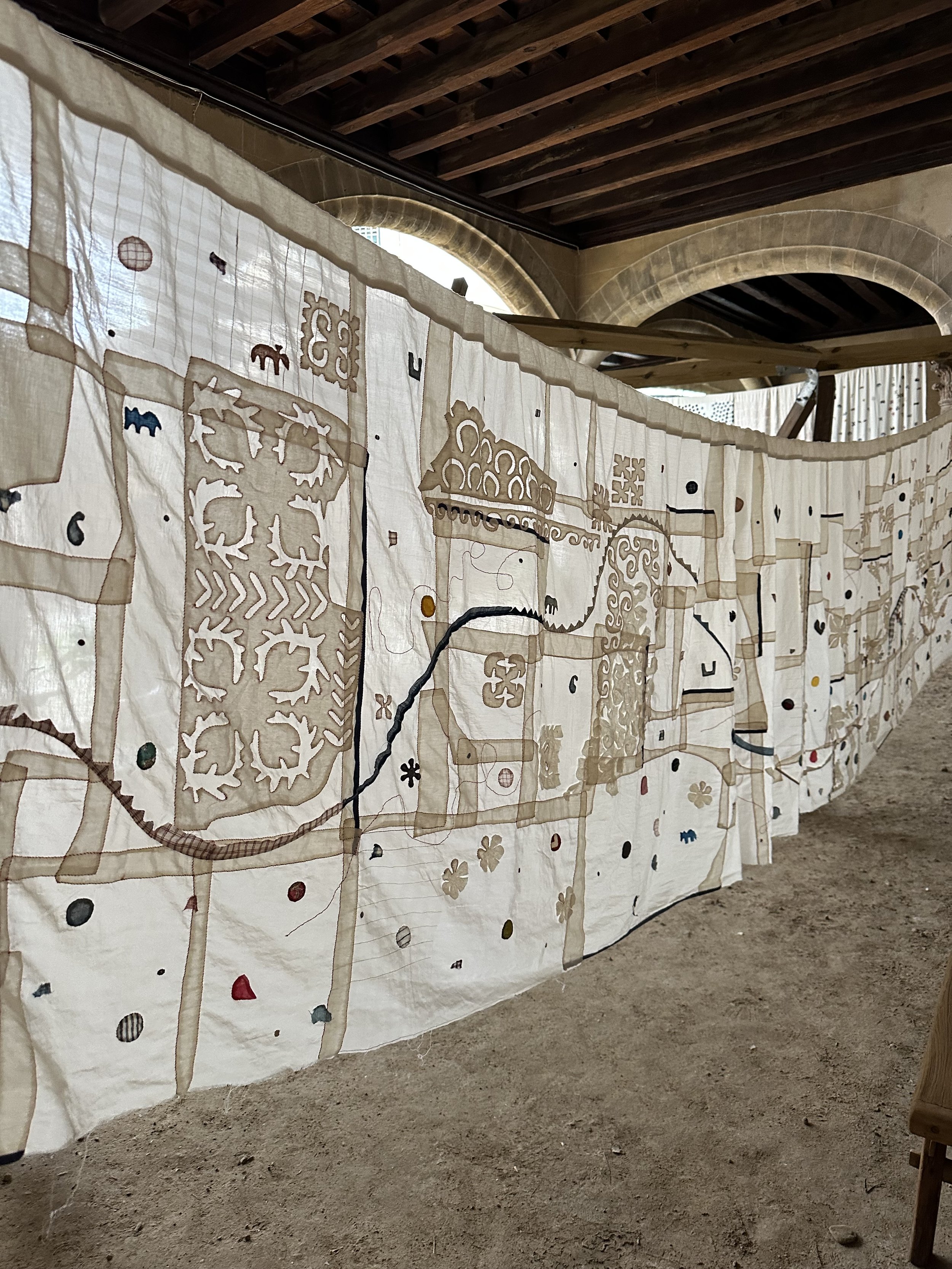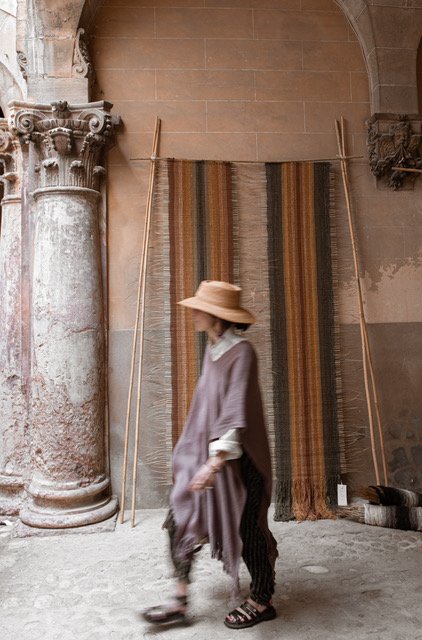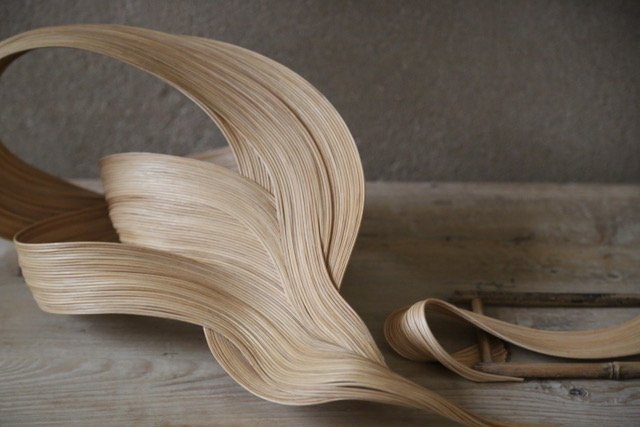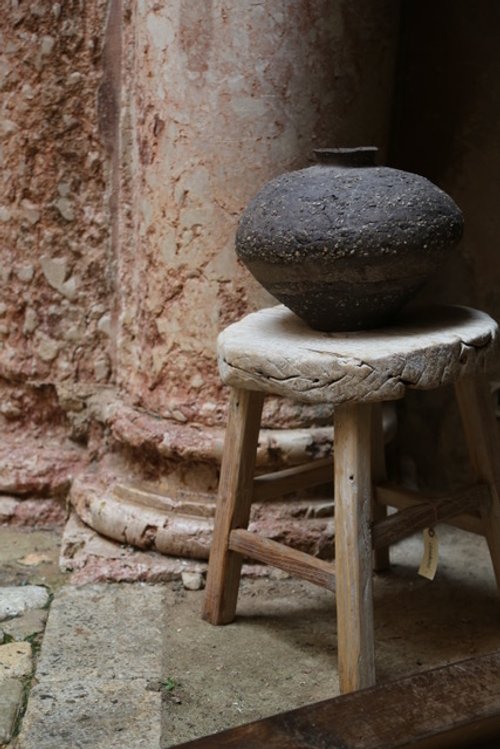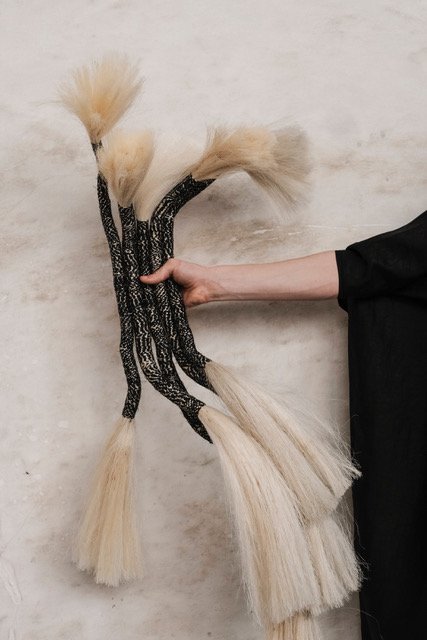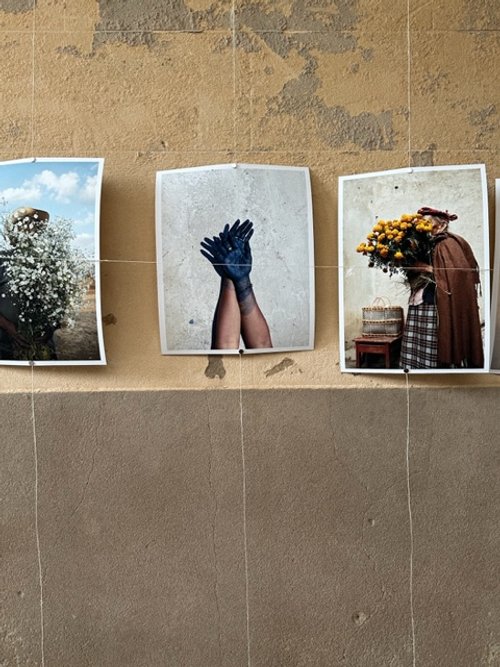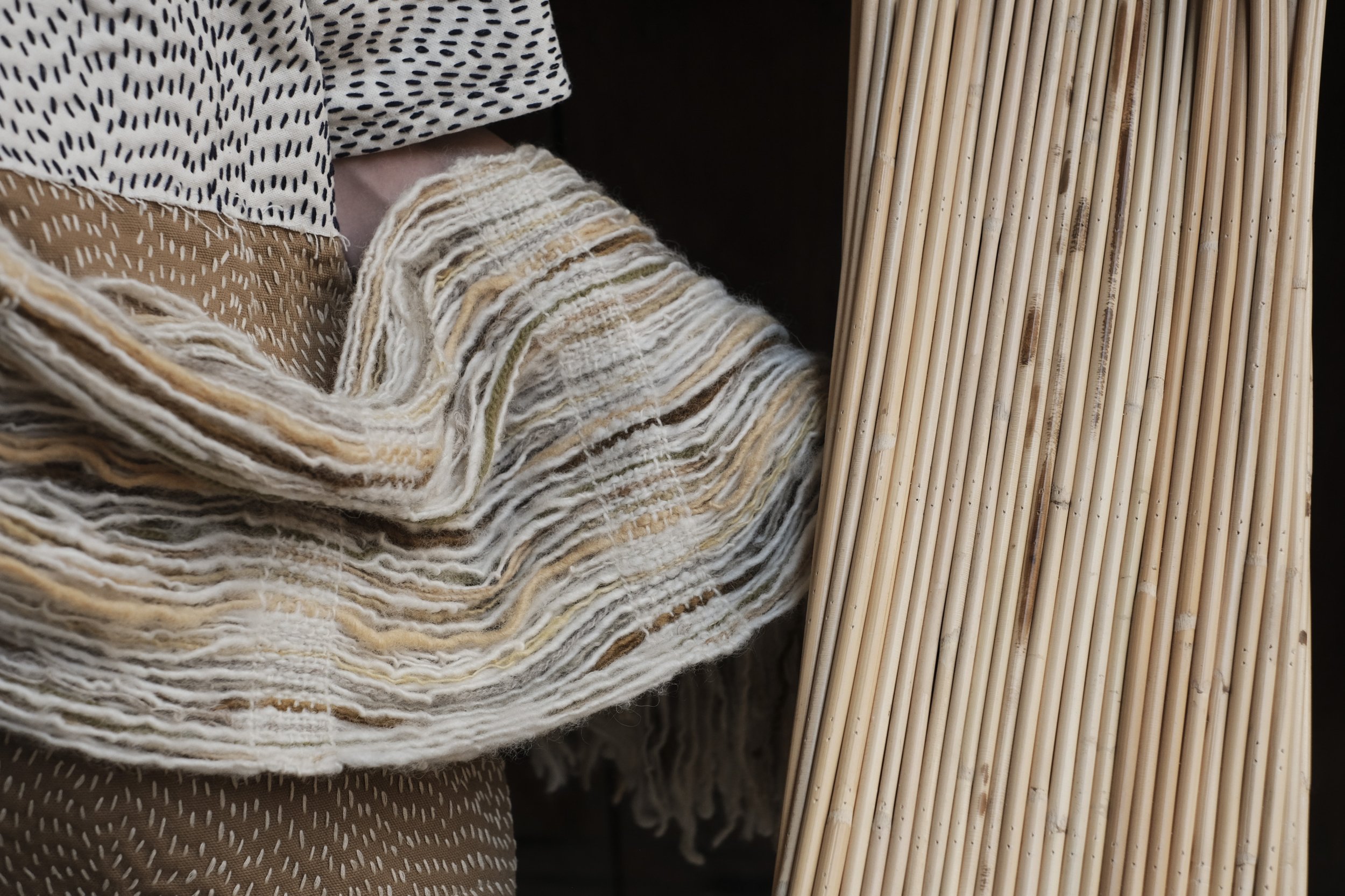
ART INSTALLATIONS
̈“Creativity Takes Courage” Henry Matisse
Photo Luvia Lazo
Christin Amann y Tatiana Sarasa Castellano
The Blooming Marshes
Art Installation / textile, soil, raw fiber, natural pigments, tools
The blooming marshes is a collaborative art installation by the artists Christin Amann and Tatiana Sarasa, that is dedicated to the Island ́s history of the cultivation of linen and hemp, dating back to the 13. century.
Inspired by the so called “Marjals Poblers” and the wetlands of S’Albufera - which nowadays is still the largest and most important wetland area in the Balearic Islands, this work tells a story about land, its changes over the time, about loss and reshaping.
@christin_amann @tatianasarasa
Carlos Fontales
Born in Madrid, at the age of 20, Carlos Fontales, moved to a village in Galicia fleeing from city life and its future prospects. Years later he began to be interested in the most popular basketry, the one made by farmers and non-specialized people. As a result of these inquiries and learning, he published a couple of books on the trade. Along with his research work and basketry itself, he dedicates his activity to traveling around Spain and other countries giving courses, seminars, conferences, as well as the occasional creation of installations with vegetable fibers and other medium and large-format works.
At XTANT, Carlos did a hands-on installation using fibers from the island
LLanatura x Elisabeth Colom
Llanatura collaborated with Elisabeth Colom on a site specific piece called ˝Material Driven Design”. This piece pays homage to the Mallorcan countryside with its stone walls, where sheep live in harmony with the landscape.
A project born from a socio-ecological perspective that culminates in a design was born from a deep understanding of the properties and limitations of this natural fiber, "Wool Driven Artistic Design" (from the concept of "Material Driven Design").
To relocate the textile production of wool to an island with a tourist monoculture is revolutionary. In Europe, wool is legally considered a by product, and handcrafting this material is a textile counterculture.
At the same time, we use felt as a creative node, as a meeting space. Taking advantage of contemporary situations to provoke new responses to production processes and waste generation. We promote the creative and artistic impulse to rebuild emotional and affective bonds with our territory.
We hope that you feel that this wool is home and travel to the origins of humanity when the protection and comfort of wool literally sustained our lives.
@llanatura
LLanatura x Adriana Meunie
Llanatura collaborated with Mallorcan Artist Adriana Meunie on a site specific piece called ˝Pensaments Esperant”. This piece pays homage to the Mallorcan wool and its many transformations.
@adrianameunie_textilework
Made in Slow
Made in Slow is a platform born from the need to preserve and recover heritage and traditional values that nowadays find serious difficulties to maintain their continuity.
Its objectives are to define viable projects on traditional Spanish activities based on criteria of sustainability, economic, social and environmental; disseminate our cultural diversity and economically impact the consumption of products at the source to improve, recovery and development of each activity on which a project is carried out.
"Transhumance by Made in Slow is the first project in which the Made in Slow platform applies this philosophy. Our goal is to revalue and enhance the value of transhumance merino wool with the aim of protecting and promoting the following values:
Biodiversity, Culture, Local economy and rural environment.
Alberto Díaz, Ceo of the project has collaborated with several artists and designers: Cristina Corres, Lorena Madrazo and Regina Dejiménez.
Cristina Corrés x Made in Slow
Popular tradition is the inspirational thread to express the culture of a place. Direct observation of nature is used as visual symbology and writing, the abstract reliefs that produce the intrinsic materials of the earth together with the figurative objects, introducing us into a revealing, sometimes invisible space.
@cristina_corres
Lorena Madrazo x Made in Slow
The rural: The installation consists of 3 pieces that express through the fabric, the space that
women occupy in the rural environment. The materials, colors and textures reveal situations and
emotions through the gestures formed by knots
The materials, colors and textures reveal situations and emotions through the gestures formed by
knots, passes and ligaments, by the altered warp.
Movements that claim the daily work, the worries, the rawness of the countryside, the routine and
the care of the environment and the animals. Also the fiesta day. There is quiet plot, tradition,
rupture, repetition and ordinariness.
@appsolescence_lorenamadrazo
Regina Dejiménez
This year from the Art and Textile Design Studio Regina Dejiménez, presents for the Xtant 2023 edition, a
series of unique and exclusive art pieces.
The theme that encompasses all the pieces is the use of Spanish transhumant sheep merino wool from
the Made in slow project combined with cotton gauze.
This collection is called Study of the Void and investigates from an artistic point of view the intersections
between matter, nature and human intervention based on concepts of quantum theory: distortion,
movement, flow...
The collaboration with the wood design studio and carpentry workshop located in Mallorca, Ducoin
Studio, is relevant. Together with this team, the artist has created a sculptural chair, called Human, which
responds to the artist's own parameters of design and organic texture.
In addition to this piece there are three sculptures, two of them luminous.
The aim of each piece is to open the field of uncertainty, estrangement, ambiguity. The transformed
matter reflects the visible and invisible phenomena that occur in nature, they are vehicles of thought, they
are activators of questions.
@reginadejimenez
www.reginadejimenez.com
Injiri x XTANT
The Sheltering Sky is beautiful piece especially made for XTANT by 15 master craftspeople in Bengal.
This installation pays homage to the traditional use of canopies in India, showcasing how textiles and architecture have always gone hand in hand in ancient times. This artwork serves as a reminder of the rich cultural legacy of India.
It comprises some of Injiri´s textile development, which has been designed over the last 10 years. These textiles are known for their fine craftsmanship and intricate designs, which reflect the geography and origin of the area they come from. The canopy is designed to let the light of the sky pass through, which creates a unique interplay of light and shadows, highlighting the beauty and intricacy of the Jamdani textiles.
Artist, textile designer and the founder of 'Injiri,' meaning "real India," Chinar Farooqui, in her work, seeks, as much to portray a love of textiles, as to carefully preserve India's craft traditions.
To her mind Injiri, as a project, is meant to be the very embodiment of the beauty found within India’s long textile design heritage. To achieve it by reinterpreting those classic forms often lost with India's ever-shifting tides in socio-economics and popular culture. Consequently her design language, then necessitated a coexistence of both old and newIndia.
@injiri
https://www.injiri.co.in
Raasleela x XTANT
For XTANT, Raasleela created a series of panels on Kora-Dye free cloth that became a collaboration between the artisans who could not travel to Mallorca due to lack of access to passports and visas, and the participating visitors who were able to finish the pieces by learning the different handmade heritage embroidery techniques including Gujarati embroidery and applique like Tikdi. A five meter long beautifully complex piece using linear fabric pieces made with Piping, Cutting and stitching of Katab (Reverse Applique), Bawaliyo technique and its variations, mirror attachment to the fabric.
Hetal Shrivastav is a weaver, creative and founder of RaasLeela Textile. Coming from a weaver’s community, Hetal has been working in Gujarat’s needle craft for decades. Using their embroideries, RaasLeela makes 100% hand sewn products that never so much as touch a sewing machine. Avoiding all forms of chemical dye or bleach-caused pollution, RaasLeela runs a zero-waste studio where absolutely all fabric scrap is upcycled into surfaces. The Brand emphasises the irregularity and unevenness of handmade products, centering the concept of non-uniformity into the very design of the product and as such making each piece unequivocally one of a kind.
Rasleela believes artisans should be involved in the design process as a means to allow them to be truly connected to their work. The idea in practice, to turn labour into a dynamic endeavour rather than a matter of following orders.
@raasleelatextile
https://www.raasleela.co.in

